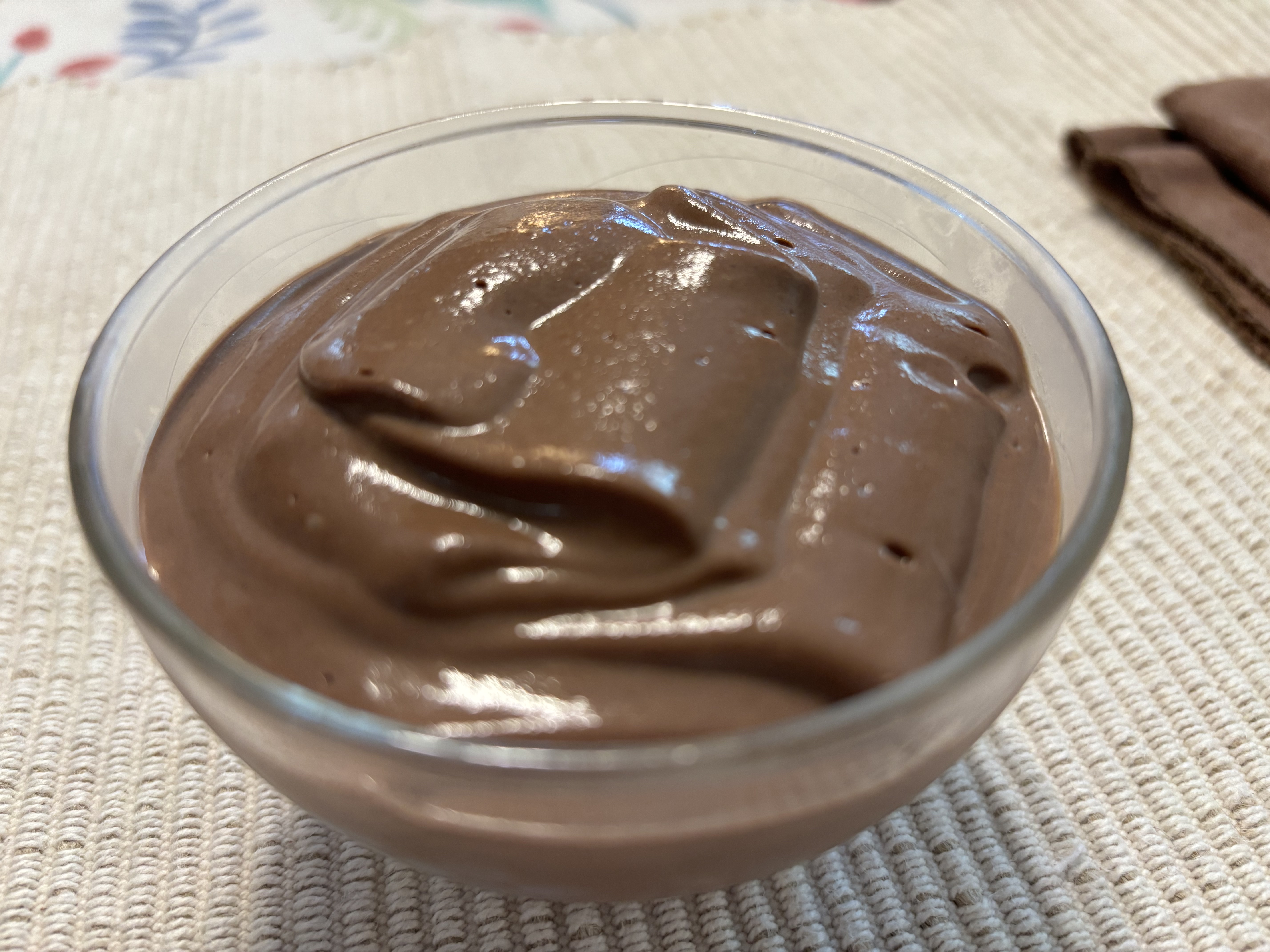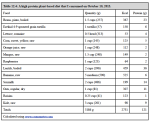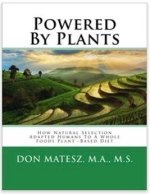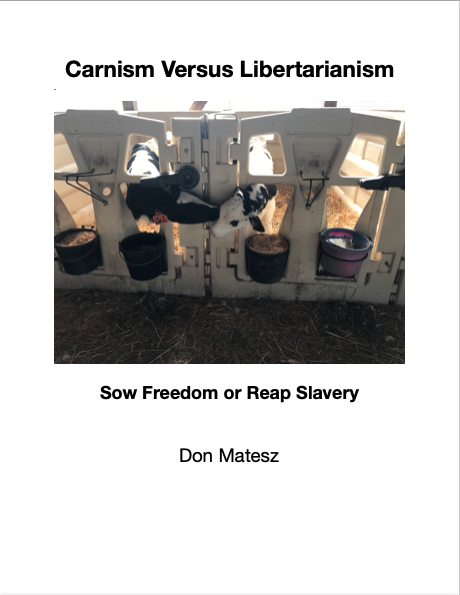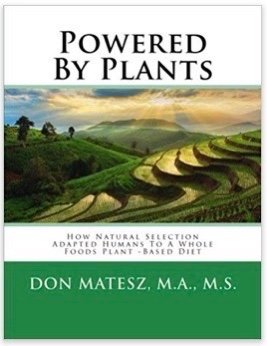Legumes for Strength, Health, and Longevity
Humans have used legumes for food from time-immemorial. All traditional agricultural people eat beans, peas and lentils regularly. Archaeologists have found evidence suggesting human use of legumes in the Near East more than 10,000 years before present.[1]
Although people use the words "legume", "pulses", and "beans" as synonyms, they actually have different meanings. We use the word legume to refer to any plant from the Fabaceae family that would include its leaves, stems, and pods. The word pulse refers to the edible seed from a legume plant. Pulses include beans, lentils, and peas. For example, the peanut belongs to the legume family, but the edible seed of the plant––the pea-nut––is the pulse. We use plants in the legume family for many agricultural applications (as cover crops or in livestock feed or fertilizers), but we typically only eat the seeds or pulses. Beans, peas and lentils are all pulses.
The preponderance of scientific research indicates that eating pulses every day can help you gain strength, health, and life expectancy.
Legumes for Gaining Strength
The pulses of legumes are rich sources of protein, starch, and fiber, and most are low in fat.
As shown, legumes provide 27-42% of their total energy content in the form of protein, which compares favorably with animal products.
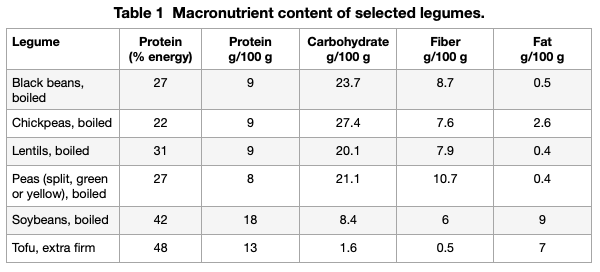
Moreover, the protein provided by legumes is similar to that of animal products. This is particularly true of soybeans and peas. As shown in Table 2, soy and pea protein isolates supply essential amino acids in quantities similar to whey protein isolate. Pea protein isolate actually supplies more leucine than whey, casein, or egg.
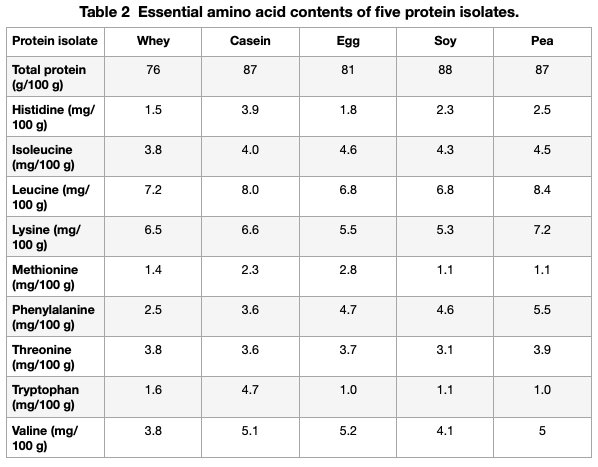
Human trials have demonstrated that legume proteins can support gaining strength and muscle mass comparable to animal proteins.
A 2018 meta-analysis of long-term studies found that supplementation with soy protein supports similar gains in strength and lean body mass gains in response to resistance training when compared to whey, beef, milk, or dairy protein.[2]
A 2021 meta-analysis also reported “results showed no significant difference between the effect of protein source on absolute and percent lean mass, with or without RET [resistance training]” and no significant difference between the effect of protein source on the measurements of muscle strength.[3] Although this study found a significant gan in both absolute and percen tlean mass with animal protein intake among adults aged less than 50 years, they did not find this effect in adults aged more than 50 years. Moreover, the magnitude of the alleged benefit of animal protein for younger adults was quite small, just 0.41 kg (0.9 pound) lean mass and 0.5% lean mass.
A double-blind, placebo-controlled study found no statistically significant difference in muscle thickness gains during resistance training between groups supplemented with pea protein or whey protein.[4] In fact, the subjects supplementing pea protein had greater gains than those supplementing whey (20% vs 15%, respectively), and only the pea protein group had gains significantly greater than the placebo group.
Hevia-Larrain and colleagues compared the effects of a mixed source high-protein (~1.6 g/kg/d) diet to those of an exclusively plant-based high-protein diet on strength and hypertrophy responses to resistance training in young men.[5] They found no significant difference in strength and hypertrophy outcomes between diet types.
We can thus conclude that plant protein supports strength and lean mass gains equally to animal protein, and substitution of plant protein for some or all animal protein intake has no adverse effect on resistance training outcomes, so long as total protein intake is adequate.
Legumes for Health
Along with protein, legumes provide folate, iron, zinc, magnesium and potassium. Compared to non-consumers, people eating a mean of 277 g/d of legumes consumed 31%, 22%, 13%, and 12% more folate, iron, zinc, and magnesium, respectively.[6]
Beans also provide a number of polyphenols, many of which are antioxidants, that may have health benefits.[7]
Clinical studies show that eating legumes daily has several health benefits[8], including:
- Improving glycemic control
- Reducing metabolic syndrome
- Reducing LDL without affecting HDL
- Reducing risk of ischemic heart disease
- Reducing inflammation
Consumption of soy protein and natto (fermented soy beans) has been linked to 25-33% decreased risk of death from total cardiovascular disease, total stroke and ischemic stroke.[9]
Taoist medicine has identified specific therapeutic properties of pulses. Generally, pulses have a sweet flavor and a neutral thermal nature. Most have the effects of strengthening the Spleen and Stomach, removing dampness and stopping diarrhea. The dampness- or edema-reducing property is partially due to pulses providing thiamin (vitamin B1) to remedy thiamin deficiency (which causes edema). Specific properties vary. For example:
- Yellow soybeans lubricate dryness and detoxify from food or hot-natured drug poisoning.
- Black soybeans promote blood circulation and fortify the kidneys.
- Peanuts moisten dry lungs and dissolve phlegm.
"Soyboy" Myth
Contrary to popular belief, soy consumption does not have adverse effects on human hormonal health. In particular, it does not adversely affect the testosterone level of men. However, accumulating evidence suggests that soy consumption may prevent prostate cancer.
A 2021 meta-analysis reviewed 41 studies looking at the effects of soy food or isoflavone consumption on levels of total testosterone, free testosterone, estrogens, and sex-hormone binding globulin in adult men. The meta-analysis found no effect of either soy protein or isoflavones on any of those levels, regardless of dose and study duration.[10]
Further, another 2021 study found a lack of evidence to justify classifying soyfoods or isoflavones as endocrine disrupters.[11]
Meanwhile, a 2007 randomized controlled trial found that when men consumed soy protein isolate having a high isoflavone level, they had an increased urinary excretion of estradiol and an increased ratio of urinary 2-hydroxy estrogens to 16 alpha-hydroxyestrone (2:16 OH-E1), both of which may be beneficial for reducing the risk of developing prostate cancer.[12]
Another study found that soy protein isolate suppresses androgen receptor expression in the prostate without altering serum testosterone levels, which might be beneficial in preventing prostate cancer.[13]
A 2016 review of evidence found that the preponderance of evidence suggests that isoflavones play a protective role against the development of prostate cancer, and indeed that prostate tissue selectively concentrates isoflavones to levels known to be anti-carcinogenic.[14]
Having watched my father suffer with prostate cancer for more than a decade, I am interested in avoiding his fate. The current state of evidence suggests that regular consumption of soybeans and soy products will have no adverse effect on testosterone levels but will have a prostate cancer preventive effect.
Legumes for Longevity
Adding adequate amounts of legumes to your diet could add years to your life.
A study that included Japanese, Greeks, Anglo-Celtic Australians, and Swedes found that each 20 g increment in legume consumption was associated with a 7-8% reduction in mortality hazard ratio.[15] The legumes commonly consumed in those cultures include soy and soy products (tofu, miso) in Japan, brown beans and peas in Sweden, and lentils, chickpeas and white beans in Mediterranean cuisine.
A 2022 study used meta-analyses and data from the 2019 Global Burden of Disease study to estimate how life expectancy (LE) changes with sustained changes in the intake of fruits, vegetables, whole grains, refined grains, nuts, legumes, fish, eggs, milk products, red meat, processed meat, and sugar-sweetened beverages.[16] The research found that sustained daily intake of legumes may provide the largest gains in life expectancy. A 200 g daily serving of legumes was associated with an increased life expectancy of 2.5 years and 2.2 years respectively for men and women who started the legume habit at 20 years of age, and 1.6 years for men or women who started the legume habit at 60 years of age.
Notes
1. Kislev ME, Bar-Yosef O. The Legumes: The Earliest Domesticated Plants in the Near East? Current Anthropology 1988 Feb;29(1):175-179.
2. Messina M, Lynch H, Dickinson JM, Reed KE. No Difference Between the Effects of Supplementing With Soy Protein Versus Animal Protein on Gains in Muscle Mass and Strength in Response to Resistance Exercise. Int J Sport Nutr Exerc Metab. 2018 Nov 1;28(6):674-685. doi: 10.1123/ijsnem.2018-0071. Epub 2018 Oct 26. PMID: 29722584.
3. Lim MT, Pan BJ, Toh DWK, Sutanto CN, Kim JE. Animal Protein versus Plant Protein in Supporting Lean Mass and Muscle Strength: A Systematic Review and Meta-Analysis of Randomized Controlled Trials. Nutrients. 2021 Feb 18;13(2):661. doi: 10.3390/nu13020661. PMID: 33670701; PMCID: PMC7926405.
4. Babault N, Païzis C, Deley G, Guérin-Deremaux L, Saniez MH, Lefranc-Millot C, Allaert FA. Pea proteins oral supplementation promotes muscle thickness gains during resistance training: a double-blind, randomized, Placebo-controlled clinical trial vs. Whey protein. J Int Soc Sports Nutr. 2015 Jan 21;12(1):3. doi: 10.1186/s12970-014-0064-5. PMID: 25628520; PMCID: PMC4307635.
5. Hevia-Larraín V, Gualano B, Longobardi I, et al. High-Protein Plant-Based Diet Versus a Protein-Matched Omnivorous Diet to Support Resistance Training Adaptations: A Comparison Between Habitual Vegans and Omnivores. Sports Med. 2021 Jun;51(6):1317-1330. doi: 10.1007/s40279-021-01434-9. Epub 2021 Feb 18. PMID: 33599941.
6. Mitchell DC, Lawrence FR, Hartman TJ, Curran JM. Consumption of dry beans, peas, and lentils could improve diet quality in the US population. J Am Diet Assoc. 2009 May;109(5):909-13. doi: 10.1016/j.jada.2009.02.029. PMID: 19394480.
7. Marathe SA, Rajalakshmi V, Jamdar SN, Sharma A. Comparative study on antioxidant activity of different varieties of commonly consumed legumes in India. Food Chem Toxicol. 2011 Sep;49(9):2005-12. doi: 10.1016/j.fct.2011.04.039. Epub 2011 May 12. PMID: 21601612.
8. Messina V. Nutritional and health benefits of dried beans. Am J Clin Nutr 2014 July;100(suppl 1): 437S-442S. <https://academic.oup.com/ajcn/article/100/suppl_1/437S/4576589?login=false>
9. Nagata C, Wada K, Tamura T, Konishi K, Goto Y, Koda S, Kawachi T, Tsuji M, Nakamura K. Dietary soy and natto intake and cardiovascular disease mortality in Japanese adults: the Takayama study. Am J Clin Nutr. 2017 Feb;105(2):426-431. doi: 10.3945/ajcn.116.137281. Epub 2016 Dec 7. PMID: 27927636.
10. Reed KE, Camargo J, Hamilton-Reeves J, Kurzer M, Messina M. Neither soy nor isoflavone intake affects male reproductive hormones: An expanded and updated meta-analysis of clinical studies. Reprod Toxicol. 2021 Mar;100:60-67. doi: 10.1016/j.reprotox.2020.12.019. Epub 2020 Dec 28. PMID: 33383165. <https://pubmed.ncbi.nlm.nih.gov/33383165/>
11. Messina M, Mejia SB, Cassidy A, Duncan A, Kurzer M, Nagato C, Ronis M, Rowland I, Sievenpiper J, Barnes S. Neither soyfoods nor isoflavones warrant classification as endocrine disruptors: a technical review of the observational and clinical data. Crit Rev Food Sci Nutr. 2021 Mar 27:1-57. doi: 10.1080/10408398.2021.1895054. Epub ahead of print. PMID: 33775173.
12. Hamilton-Reeves JM, Rebello SA, Thomas W, Slaton JW, Kurzer MS. Soy protein isolate increases urinary estrogens and the ratio of 2:16alpha-hydroxyestrone in men at high risk of prostate cancer. J Nutr. 2007 Oct;137(10):2258-63. doi: 10.1093/jn/137.10.2258. PMID: 17885008.
13. Hamilton-Reeves JM, Rebello SA, Thomas W, Slaton JW, Kurzer MS. Isoflavone-rich soy protein isolate suppresses androgen receptor expression without altering estrogen receptor-beta expression or serum hormonal profiles in men at high risk of prostate cancer. J Nutr. 2007 Jul;137(7):1769-75. doi: 10.1093/jn/137.7.1769. PMID: 17585029.
14. Zhang HY, Cui J, Zhang Y, Wang ZL, Chong T, Wang ZM. Isoflavones and Prostate Cancer: A Review of Some Critical Issues. Chin Med J (Engl). 2016;129(3):341-347. doi:10.4103/0366-6999.174488
15. Darmadi-Blackberry I, Wahlqvist ML, Kouris-Blazos A, Steen B, Lukito W, Horie Y, Horie K. Legumes: the most important dietary predictor of survival in older people of different ethnicities. Asia Pac J Clin Nutr. 2004;13(2):217-20. PMID: 15228991.
16. Fadnes LT, Økland J-M, Haaland ØA, Johansson KA (2022) Estimating impact of food choices on life expectancy: A modeling study. PLoS Med 19(2): e1003889. https://doi.org/10.1371/journal.pmed.1003889
Recent Articles
-
Ancient Roman Soldier Diet
Apr 14, 25 05:19 PM
A discussion of the ancient Roman soldier diet, its staple foods and nutritional value, and a vegan minimalist version. -
High Protein Chocolate Tofu Pudding
Jul 01, 24 12:41 PM
A delicious high protein chocolate tofu pudding. -
Vegan Macrobiotic Diet For Psoriasis
Sep 05, 23 06:36 PM
Vegan macrobiotic diet for psoriasis. My progress healing psoriasis with a vegan macrobiotic diet. -
How Every Disease Develops
Aug 04, 23 06:22 PM
How every disease develops over time, according to macrobiotic medicine. -
Why Do People Quit Being Vegan?
Jun 28, 23 08:04 PM
Why do people quit being vegan? How peer pressure and ego conspire against vegans. -
Powered By Plants
Mar 16, 23 08:01 PM
Powered By Plants is a book in which I have presented a lot of scientific evidence that humans are designed by Nature for a whole foods plant-based diet. -
Carnism Versus Libertarianism
Dec 30, 22 01:55 PM
Carnism Versus Libertarianism is an e-book demonstrating that carnism is in principle incompatible with libertarianism, voluntaryism, and anarchism. -
The Most Dangerous Superstition Book Review
Nov 15, 22 08:46 PM
Review of the book The Most Dangerous Superstition by Larken Rose.

